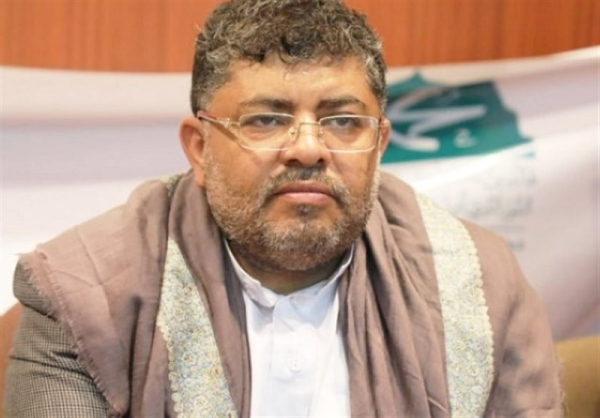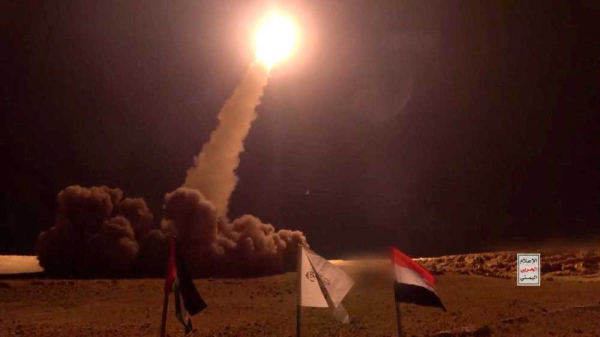zarezadeh
Al-Houthi: The Yemeni nation is not afraid of American terrorism
Mohammed Ali Al-Houthi, a member of the Supreme Political Council of Yemen, announced that American terrorism does not instill fear in the hearts of the Yemeni nation following the US and British attacks on Yemen that left dozens of martyrs.
According to the Tasnim News Agency International Group, Al-Houthi stated in a speech to the marchers present in Sab'in Square in Sanaa: The Yemeni nation does not in any way fear American attacks, bombings, arrogance and terrorism, and only fears God.
He continued by saying to the oppressed people of Gaza who are still under siege by the criminal Zionist regime: We are always with you and we will never abandon you.
Addressing the American officials, Mohammed Al-Houthi said: Do whatever you like, because we have no fear except God. Our positions are correct and principled positions, but Trump's positions are worthless and illegitimate.
He also continued: "Your participation in the attack on Gaza or the bombing of Yemen is not new, you have been participating in the attacks and bombing of our country for more than ten years." Al-Houthi added: "We consider what happened at the hands of you Americans in Yemen as an attack and a terrorist act, and we are waiting for an escalation of tension in response to your escalation."
Why did Trump attack Yemen?
Donald Trump has opened a new case in Yemen at a time when his promises and threats in other foreign policy cases have fallen flat.
According to the Tasnim News Agency International Group, since he took office in the White House, Donald Trump, the President of the United States of America, has been forced to backtrack on almost every sharp threat or optimistic promise he made in the field of foreign policy.
Trump's backtracking on threats
He had said this more than 10 times during the election campaign that he would end the war in Ukraine within 24 hours if he became president, but now he has not only not unraveled any of the knots in this case, but has also further complicated its knots and has finally been forced to say that his election promises were a joke.
Regarding Gaza, he set a deadline of several days last month, saying that if Hamas did not release all prisoners “by 12 noon on Saturday,” the gates of hell would be opened to them. Trump’s promised Saturday arrived, but nothing happened, and he threw the ball into Israeli territory, saying that Israel must decide what to do.
He has also backed away from his plan to relocate Gaza residents. Trump has repeatedly said that he intends to relocate Gaza residents to Jordan or Egypt and turn the region into a “Middle East Riviera,” but after facing global condemnation and Palestinian resistance, he said just a few days ago that “no one said the people of Gaza should leave their land.”
In the area of the tariff war, the situation has been just as dire for Trump, if not more so. He had threatened to double tariffs on steel and other metals from Canada to 50 percent, but only backed down hours later when Ontario countered.
On auto tariffs, he suspended tariffs on autos in Mexico and Canada for a month after talks with three U.S. automakers.
Trump's promises to annex Greenland, Panama, and Canada have al
What is the difference between a valid prayer and an accepted prayer?
There is a difference between the validity of actions and the acceptance of actions; what is mentioned in jurisprudence in terms of the conditions of the person praying, such as clean clothes, a clean body, a clean place, correct recitation, etc., and which refers to the appearance of the prayer, will cause the prayer to be valid; not its acceptance; because the conditions for acceptance are related to the inner nature of worship and its spiritual and mystical effects.
The validity of a prayer means that there is no qadha, return, or punishment, and the person has fulfilled his duty; but the acceptance of a prayer has other conditions, including the presence of the heart, eating halal food, and the absence of a forbidden morsel in the body, etc.
One of the conditions for acceptance that God states in the Quran is piety; In verse 27 of Surah Al-Mandah it is stated: And recite to them the story of the two sons of Adam in truth: When each of them did something to draw near (to Allah), but it was accepted from one and not accepted from the other (the brother whose deed was rejected said to the other brother): “By Allah, I will kill you!” (The other brother) said: “(What is my sin? Because) Allah accepts only from the righteous!” Just as transgression prevents the acceptance of worship; in verse 53 of Surah At-Tawbah we read: Say: “Spend (in whatever way you wish) willingly or unwillingly, it will never be accepted from you, for you are a rebellious people.”
UN experts slam ‘disproportionate’ arrests of pro-Palestinian students in US
US campuses including Columbia University in New York were rocked by student protests against Israel’s war in Gaza following the Hamas-led October 7, 2023 attacks, drawing accusations of anti-Semitism.
Immigration officers arrested Mahmoud Khalil, a leader of protests at Columbia, on the weekend of March 9-10 after US President Donald Trump pledged to deport foreign pro-Palestinian student demonstrators.
The White House later said authorities had supplied a list of other Columbia students who officers were seeking to deport over their alleged participation in protests.
“These actions are disproportionate, unnecessary, and discriminatory and will only lead to more trauma and polarisation negatively impacting the learning environment within university campuses,” a group of United Nations-appointed experts said in a statement.
“These actions create a chilling effect on the rights to freedom of expression, assembly and association,” they added.
The independent experts, appointed by the UN to report on rights issues, urged US authorities “to cease repression and retaliation, including in the form of arbitrary detention of US lawful permanent residents, and removal of international students who have participated in university protests”.
Educational, social and health effects of fasting
Fasting has various dimensions and has many material and spiritual effects on the human being, the most important of which is its "moral dimension and educational philosophy".
1. Educational effects
1-1. Softening the soul
The human soul is always managing the body, and the body without the management of the soul is like a ship without a captain. In the month of Ramadan, due to abstaining from eating and drinking and limiting it to specific hours, as well as controlling the senses (such as the eyes, ears and all channels of information entering the mind), more leisure is provided for the soul and spirit. The activity of the soul to deal with material and worldly matters decreases and the possibility of dealing with spiritual matters increases. As a result, the soul enjoys greater softness.
1-2. Strengthening the will
God has arranged the fasting program in such a way that a person must refrain from eating and drinking at a certain time, and at a certain time, he can freely eat and drink and enjoy halal pleasures.
The obligation for people to strictly implement this program and repeat it throughout a month is a very suitable exercise for accustoming the soul to things other than what it was accustomed to in other months, and this action strengthens a person's determination and will.
1-3. Controlling Instincts
While fasting, the fasting person should turn a blind eye to food, water, and other pleasures (such as sexual pleasure) and prove that he is not like animals, confined to a stable, water, and grass. He can take control of his soul and dominate his desires and passions, which causes his instincts to come under his control and, in addition, there is a moderation in their use. In short, fasting elevates man from the animal world and ascends to the world of angels.
Piety and piety play a very important role in the education of a Muslim's Islamic morality, and the best way to achieve this worthy quality is fasting. The Quran says about it: "That you may be righteous"; Al-Baqarah (2), verse 183. That is, the result and the ultimate cause of fasting is piety from the forbidden things of God.
When the Prophet (peace be upon him and his family) enumerated the virtues of Ramadan and fasting in his sermon of “Sha’baniyah”, the Commander of the Faithful Ali (peace be upon him) asked: What are the best deeds in this month? He said: “Al-Wur’ ‘an mahram Allah”; Ayoun Akhbar al-Rida, vol. 2, p. 266. ; “It is abstinence and avoidance of sins and transgressions.” Therefore, fasting is a factor that prevents sin and a factor that suppresses the rebellious soul. By acting on this divine command, a person well revives the spirit of piety and piety in himself; because with fasting, it becomes easier to correct and train the soul; because hunger and other deprivations of fasting extinguish the rebellious flames of animal instincts and carnal desires.
Filling the stomach becomes the basis for many abnormalities and the stimulation of lusts, immersion in forbidden things and the emergence of false desires in the soul; As stated in a hadith: “I fear for you from the stomach and the private parts”; Bihar, vol. 1, p. 368. “I fear for you from the stomach and the private parts.” If the stomach is chaste and is content with what is necessary and avoids what is forbidden and doubtful, then undoubtedly the private parts will also be chaste. The chastity of these two organs will be a very good basis for spiritual joy and purity of the heart and inner self.
1-4. The spirit of sacrifice and altruism
Man is a social being, and a perfect man is one who grows in all dimensions of existence. Fasting develops the social dimension of man along with his other dimensions; in such a way that it is a lesson of equality and equity among the members of society. By practicing this religious injunction, the able-bodied people understand the situation of the hungry and deprived in society in a tangible way, and following that understanding, they come to the conclusion that they should think about the poor and deprived. If attention to the situation of the hungry takes on a sensory and objective aspect, it has a greater effect, and fasting gives a sensory color to this important social issue. With the growth of this social dimension, man does not become indifferent to his fellow human beings and feels the widespread social pains (such as poverty and hunger), and this wise saying of Saadi becomes true:
Human beings are members of each other, who are created from one essence.
If one member suffers, the other members will not be spared.
Really, if the rich countries of the world fasted for a few days a year and tasted hunger, would there still be so many hungry people in the world? Will millions of people face malnutrition and food shortages?
Two. Health effects
Without a doubt, the miraculous effect of abstinence in treating various physical and mental diseases has been proven in medical science. The cause of many diseases is overeating of various foods. The Prophet of God, may God’s prayers and peace be upon him and his family, said: “And know that the stomach is the house of disease and that health is the cure.” Bihar al-Anwar, vol. 58, p. 307, (Beirut, Al-Wafa Foundation).; “The stomach is the center and home of every pain, and abstinence [from inappropriate foods and overeating] is the basis of every healing medicine.” The origin of many mental illnesses is wrong thoughts, suspicions, sins, and irrational and illogical cognitions, and fasting, by creating restrictions, strengthens both the stomach and digestive system, and by controlling thoughts and avoiding sins, it prevents the human soul from pollution. In other words, fasting burns the body’s waste and excess and unabsorbed substances, and in fact, it “shakes the house” of the body and strengthens the soul by reciting the Quran and reciting special prayers. In short, fasting guarantees a person’s physical and mental health, and on this basis, the Prophet of Islam, may God’s prayers and peace be upon him and his family, said: “Fast until you become healthy.”; Ibid., p. 255.; “Fast until you become healthy.” Fasting, if taken in its proper conditions, has important educational, social, and health effects on humans. For further reading, see:
A. Alexis Sophorin, Fasting, a New Method for Treating Diseases, translated by Jafar Emami.
B. Seyyed Hossein Mousavi Lahiji, Fasting, Treatment of Diseases of the Soul and Body, (Published by the Society of Seminary Teachers), Qom.
P. Abdul Karim Biazar Shirazi, A New Treatise on Medical Jurisprudence, Vol. 2, (Islamic Culture Publishing House).
T. Seyyed Reza Paknejad, The First University and the Last Prophet, Vol. 3; (Islamic Bookstore Publications).
IRIB World Service decries US-EU ban on Aqsa TV, urges action against media censorship
The head of the Islamic Republic of Iran Broadcasting (IRIB) World Service has condemned a recent decision by the United States and the European Union to ban the broadcast of al-Aqsa TV, calling on media activists to strengthen the front against Western media censorship.
Ahmad Norouzi issued a statement on Monday after the US and the EU threatened to impose heavy fines and bring criminal charges against satellite providers broadcasting the Gaza-based channel. It followed the television network's suspension from the French satellite provider Eutelsat after an Israeli complaint.
Norouzi said that al-Aqsa TV was not only removed from all European and American satellites in "a joint US-EU plot," but also received threats of sanctions from satellite companies based on a fake anti-terrorism law.
"This desperate act came after 25 colleagues of the network sacrificed their lives to deliver the voice and images of the oppressed people of Gaza and were martyred in violation of all international rules," he said.
"It is another example of the brutality of the usurping Israeli regime ... throughout its history of occupation."
Norouzi also noted that the US and European leaders had shown a "humiliating reaction" to the enlightening role played by al-Aqsa TV.
The IRIB World Service "calls on all media activists in the field of resistance ... who have now lost one of the most important media outlets engaged in exposing Zionist crimes, to condemn this move and strengthen their opposition to Western media censorship."
The Arabic-language channel, affiliated with the Hamas resistance movement, has been a crucial source of information about the Israeli genocide in Gaza and violent attacks in the West Bank.
In a statement, the channel vowed to continue its mission despite the "unjust" ban.
The US-EU decision is inseparable from the open war on Palestinian media, which has culminated in the cold-blooded targeting of journalists, it pointed out.
"The occupation assassinated more than 25 journalists from the channel's crew and destroyed its headquarters in the Gaza Strip, in a desperate attempt to silence the truth."
Press TV’s website
Was the entire Quran revealed in the month of Ramadan?
Regarding the quality of the revelation of the Quran, two types of verses can be classified:
1.
Verses that indicate the revelation of the Quran on the Night of Power and the month of Ramadan; such as verse 185 of Surah Al-Baqarah, verse 3 of Surah Al-Dukhan, and verse 1 of Surah Al-Qadr.
2.
Verses that indicate the gradual revelation of the Quran over a period of 20 to 23 years; such as verse 106 of Surah Al-Isra’ and verse 32 of Surah Al-Furqan. Here, one may ask: How can we reconcile these two groups of verses and how is the time of the Prophethood acceptable with the statement that the Quran was revealed on the Night of Power?
The answers given by Sunni and Shiite scholars are as follows:
1. Most Sunnis and some Shiite scholars (such as Sheikh Mufid, Sayyid Murtaza, and Ibn Shahr-e-Ashhub) have answered: The meaning of the revelation of the Quran on the Night of Power is the beginning and commencement of the revelation, which was in the month of Ramadan; Because every event can be attributed to the time of its beginning. See: Muhammad Hadi Maraf, Al-Tamhid, Vol. 1, p. 113. Therefore, according to this group, the first group of verses does not stand in opposition to the provisions of the second group.
2. Some have said: What is meant by “Ramadan” is not Ramadan of a specific year; rather, it is its type; that is, on every Night of Power of every year, the Quran was revealed to the Prophet (peace and blessings of Allaah be upon him and his family) according to the needs of the people, and Gabriel recited it to his Prophet (peace and blessings of Allaah be upon him and his family) in times of need, by the command of Allaah. Fakhr al-Razi has given this possibility. See: Al-Tafsir al-Kabir, Vol. 5, p. 85. It is obvious that with this assumption, the first group is opposed to the second group.
3. According to some: The meaning of the first group is that the verses of the Quran were revealed in the month of Ramadan, and in this regard, attributing the revelation of the Quran to the month of Ramadan is correct. See: Sayyid Qutb, In the Shadow of the Quran, Vol. 2, p. 79.
4. Some - including Sheikh Saduq - believe that the Quran was revealed in its entirety on one night of Qadr - in Bayt al-Izzah or Bayt al-Ma’mur. Then it was revealed to the Prophet (peace be upon him and his family) gradually over a period of 20 or 23 years. This view is derived from some narrations. For example, Imam Sadiq (peace be upon him) says: “The Quran was revealed at one time in Bayt al-Ma’mur. Then it was revealed to the Prophet (peace be upon him and his family) over a period of twenty years.” See: Saduq, Al-I’tiqadat, p. 101; Bihar al-Anwar, vol. 18, p. 250. 5. Some other Shiite scholars (such as Fayz Kashani, Tafsir al-Safi, vol. 1, p. 41, and Abu Abdullah Zanjani, Tarikh al-Quran, p. 10) have said: The meaning of the revelation of the Quran is not the descent of its words; Rather, it refers to its truths and concepts, and also to the descent of the Quran to the heart of the Messenger of God, which is referred to in narrations as “Bayt al-Ma’mur.”
6. Allamah Tabatabayi, may God have mercy on him, distinguishes between the gradual and the sudden descent: “Anzal” is the sudden descent that includes the stage of concepts and truths and the level of rulings, and “Tanzil” is the gradual descent that includes the stage of pieces and the level of detailing the Quran. This view is derived from some Quranic evidence, including: “A book whose verses are wise, then they are explained in detail by a wise, knowledgeable person”; Hud (11), verse 1.
Allamah Tabatabayi, may God have mercy on him, has explained the reason for the need for the sudden descent as follows: “The Holy Quran has a sublime truth, an inner spirit, and a simple existence; Just as it contains a truth that has been detailed and analyzed in the form of words and phrases. Once, the same simple truth and the universal spirit, the closed and sublime Quran, from the Preserved Tablet - which is a level of divine knowledge - was revealed to the soul and spirit of the Holy Prophet (peace and blessings of Allah be upon him and his family) in a temporary form; because the one who is a teacher, a mentor, a herald, a warner and a mercy for the worlds, must know the main points, purposes and objectives of the call and the heavenly message and his book in a general and comprehensive way and become aware of the great divine teachings and the religion of guidance and the supreme truths of creation and the secrets of existence. For more information, see:
A. Al-Mizan, Vol. 2, pp. 15 and 18, Vol. 18, p. 139, Vol. 14, pp. 231 and 232.
B. Abdullah, Javadi Amoli, Quran in Interpretation, Tafsir Mozhozi, pp. 72-74..
Therefore, the reason for the partial revelation of the Quran is to become aware of the goals, plans, guidance and truths in a general and general way. It is necessary that the Prophet (peace and blessings of Allah be upon him and his family) benefited from this unseen knowledge and grace; although the gradual revelation and in accordance with the events and needs has a great effect on stabilizing the heart of the Prophet (peace and blessings of Allah be upon him and his family), and the order of the revelation of the divine verses is very helpful and useful for guiding mankind and providing a model for the formation of an Islamic civilization.
Among the above statements, the view of Allamah Tabataba'i has theological support; However, some researchers of Quranic sciences do not consider the late scholar's arguments complete and believe that what can be accepted as certain is only the gradual revelation and the virtue of the blessed month of Ramadan is the beginning of the revelation of verses from the Quran in it - as a book of human guidance. See: Muhammad Hadi, Ma'rifat, Al-Tamhid, Vol. 1, pp. 101-121.
Did the month of Ramadan and fasting exist in past religions?
The Bible Dictionary states: "Fasting has been common at all times among every tribe, nation, and religion, in times of unexpected sorrow and hardship." The Bible Dictionary, p. 427, quoted from: Tafsir al-Numno, vol. 1, p. 633.
It also comes from the Torah that Moses, peace be upon him, fasted for forty days: "When I went up the mountain to take the stone tablets (the tablets of the covenant that God made with you). Then I stayed on the mountain forty days and forty nights; "I neither ate bread nor drank water." Torah, Deuteronomy, Vol. 9, No. 9, quoted by: Tafsir al-Namno, Vol. 1, p. 632.
It also comes from the Gospel of Luke that the apostles of Christ fasted. Gospel of Luke, Vol. 5, No. 3533.
Fasting is a common practice among Jews; however, it is practiced only on the day of "Kippur" (Day of Atonement). On this day, Jews fast from the evening of the previous day to the evening of this day to atone for their sins, and they abstain from eating, drinking, bathing, and working, and engage in worship and seeking forgiveness in synagogues. Hossein Towfiqi, Introduction to the Great Religions, (Tehran, Samat, Taha and the World Center for Islamic Sciences, third edition, winter 1379), p. 94.
What does “Ramadan” mean?
Some people consider “Ramadan” to be derived from “Ramadh” which means the melting of stones due to the intense heat. Since the obligation to fast during the month of Ramadan coincided with the intense heat, they named this month Ramadan. In one sense, the month of Ramadan is the month of burning sins, and even more so, the burning of the human soul, which cooks the raw human being so that the veil of egoism and selfishness is removed. Others consider Ramadan to be derived from “Ramaidh”, meaning clouds and rain at the end of the peak of summer and the beginning of the autumn season, which removes the heat of summer. For this reason, this month has been called “Ramadan” because it cleanses the bodies of people from sins. Suyuti, Al-Dar Al-Manthur, Vol. 1, p. 183. Others consider “Ramadan” to be derived from “Ramadht Al-Nusl Armadah Ramada”; In the sense that they put the spear between two stones and beat it until it becomes thin. In this interpretation, Ramadan means that a person places himself between obedience and worship of God so that his soul becomes soft and ready for service. Therefore, some say: “Ramadan” is the name that Islam has given to this month and according to another opinion, it has been called this since the time of ignorance. Sayyid Ali Khatan al-Husseini al-Madani al-Shirazi, Riyadh al-Salikin fi Sharh Sahifa al-Sajjadiyah, vol. 6, pp. 10-11, Researched and published by the Islamic Publishing Foundation, Qom, bi-ta.. In the meaning of “Ramadan”, two points are mentioned that are stated in the narrations: 1. In many narrations of the Ahl al-Bayt (a.s.), it is forbidden to say the word “Ramadan” alone and it is recommended to call it “the month of Ramadan”; Because “Ramadan” is one of the names of God. Tarih, Majma’ Al-Bahrayn, Vol. 2, p. 223. It has been narrated from the Commander of the Faithful (peace be upon him): “Do not say Ramadan; rather, say the month of Ramadan and respect it.” Al-Kulaini, Al-Kafi, Vol. 4, p. 69. Imam Baqir (peace be upon him) said: “Do not say “This Ramadan” and “Ramadan has gone” or “Ramadan has come”; because “Ramadan” is a name of God that does not come and does not go. Going and coming are characteristics of the ephemeral being.” Ibid., pp. 69 and 70. So in fact, “Ramadan” is a name of God and the month of Ramadan is the month of God. This is the same expression from the Holy Prophet (peace be upon him and his family) in the Sha’baniyah sermon: “O people, I have come to you the city of Allah”; Sayyid Ibn Tawus, Al-Iqbal, Vol. 1, p. 26. “O people! "Verily, the moon of God has turned towards you."
Yemen warns US: Even one million raids won’t break nation’s resolve; aggressors ultimate losers
Yemen’s Ansarullah popular resistance movement has reasserted the country’s unyielding determination to resist and confront foreign aggression aimed at forcing the Arab country to stop its pro-Palestinian operations.
"Sana'a was not broken by 200,000 raids, and its steadfastness will not be broken by a million raids," Abdulrahman al-Ahnoumi, director of the Yemeni General Corporation for Radio and Television said.
The official was referring to the Arab Peninsula nation’s coming under numerous incessant aerial assaults by a Saudi Arabia-led military coalition, which invaded the country in 2015, as well as ongoing American, British, and Israeli attacks against the Yemeni people.
He made the remarks as the United States claimed to carry out major airstrikes across Yemen on Sunday night, hours after the Ansarullah resistance movement warned that the Yemeni Armed Forces will target the American aircraft carrier, and warships in the region.
“The Yemeni people will not abandon Gaza, even if we are all martyred,” he told Palestine's Shehab news agency, pointing to the Palestinian territory that has endured more than 15 months of a heavily-US-backed Israeli war of genocide.
Under the authority of Ansarullah’s leader Abdul-Malik al-Houthi, Yemen’s Armed Forces began targeting key Israeli sites in October 2023 after the regime launched the brutal war and significantly tightened its restrictions on the entry of essential supplies such as food, medicine, and other crucial resources into the coastal sliver.
The strikes, along with other operations against Israeli ships carrying military and commercial supplies to the occupied Palestinian territories, severely impacted the Israeli economy.
Yemeni forces halted their operations in January following a ceasefire agreement between Tel Aviv and the Gaza-based Palestinian resistance movement Hamas.
However, the Israeli regime has repeatedly breached the agreement, causing deadly and devastating consequences for Gaza’s population. It has also blocked humanitarian aid from entering the territory in an effort to pressure Hamas into handing over remaining Zionist captives in Gaza.
Al-Houthi recently issued a four-day ultimatum to Tel Aviv, demanding the opening of Gaza’s crossings so aid supplies could reach the impoverished territory’s two-million-plus population.
After the regime ignored the deadline, Yemen’s Armed Forces resumed enforcing their ban on Israeli vessels passing through the Red Sea, the Arabian Sea, the Bab el-Mandeb Strait, and the Gulf of Aden.
In response, US President Donald Trump issued an executive order on Saturday, sanctioning deployment of “overwhelming lethal force” towards forcing Sana’a into lifting the ban. According to the Yemeni health ministry, the escalation has so far claimed the lives of scores of non-combatants, targeting purely civilian targets.
Al-Ahnoumi emphasized that the ongoing aggression against Yemen, primarily led by the United States and the United Kingdom, would ultimately fail. He asserted that Yemen’s principled stance against Israeli occupation and aggression would be victorious in the long run, despite the Western atrocities.
“The Yemeni people are adhering to their firm position in supporting Gaza, despite threats and aggression,” he said, asserting that under al-Houthi’s leadership, the country would continue with its retaliatory measures until the siege on Gaza was lifted and the Israeli regime’s assault against the Palestinian territory came to an end.
‘US threats equal psychological warfare’
The official dismissed Trump’s threats as “psychological warfare” designed to intimidate the Yemeni people and weaken their resolve.
“These threats, along with the airstrikes, are nothing but propaganda aimed at dissuading us from our support for Gaza,” he said. “They repeat the phrase: ‘Your time is over…,’ but, thank God, such rhetoric does not frighten us or deter us from our duty of jihad (struggle) for the sake of God and Palestine.”
The Yemeni forces have, meanwhile, been responding firmly to the American escalation.
On Sunday, spokesman Brigadier General Yahya Saree announced that the troops had successfully targeted a US aircraft carrier for the second time in 48 hours, besides thwarting a hostile enemy attack against the Arab country.
Press TV’s website


























